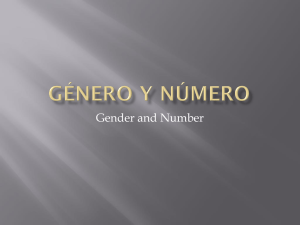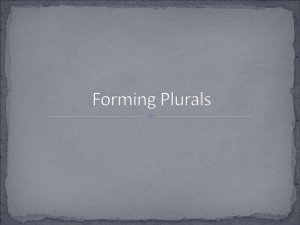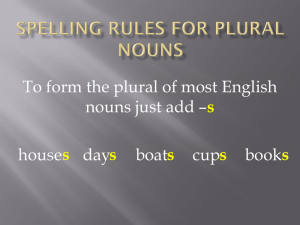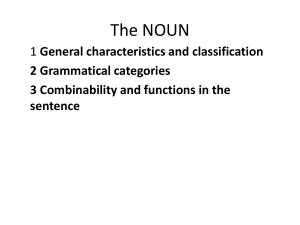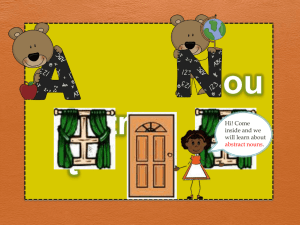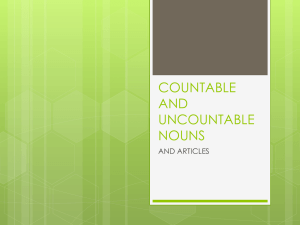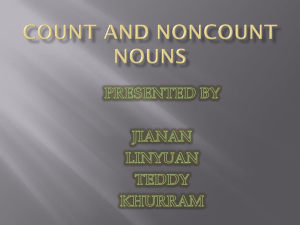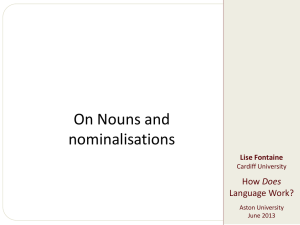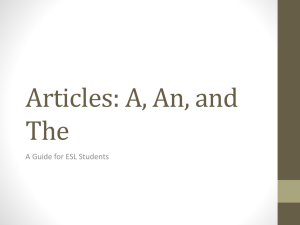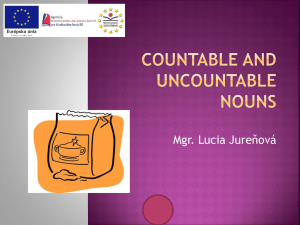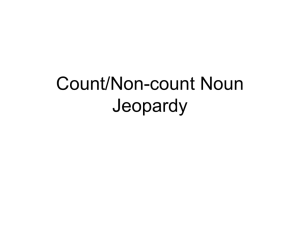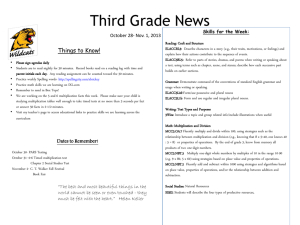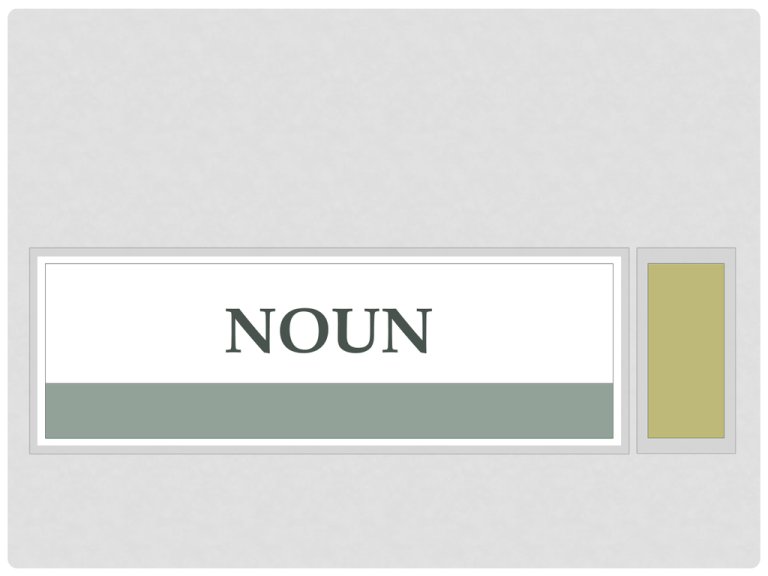
NOUN
DEFINITION OF NOUNS
Semantic
properties
Meaning
Grammatical
categories
Morphological
information
Gender
Prefixes
Number
Suffixes
Case
SEMANTIC PROPERTIES
SEMANTIC PROPERTIES
• Nouns are described as words that
refer to a person, place, thing, event,
substance, quality, quantity, idea etc.
• Classification of nouns:
• Proper nouns and common nouns
• Countable and uncountable nouns
• Concrete, abstract and collective nouns
INFLUENCES IN ENGLISH
WORDS WITH INTERESTING ORIGINS
• Biro ‘ball-point pen’, named after László Bíró, its
Hungarian inventor
• Boycott ‘refuse to deal with’ after a landlord in Ireland
who made himself unpopular by his treatment of his
tenants and was socially isolated
• Braille ‘writing system for blind people’ after Louis Braille,
its French inventor
• Mentor ‘loyal and wise adviser’ from Mentor, friend of
Odysseus
• Pamphlet ‘a small leaflet’ from a character Pamphilus, in
a 12th century love poem
• Tawdry ‘cheap and tasteless’ from St Audrey, at whose
annual fair in the town of Ely, near Cambridge, cheap
gaudy scarves were sold
trilby
bowler
busby
stetson
mackintosh
cardigan
leotard
wellington
COUNTABLE – UNCOUNTABLE
container
usually made of
typical contents
bag
cloth, paper, plastic
sweets, shopping, letters
barrel
wood and metal
wine, beer
basin
pottery, metal
ingredients for making a cake
basket
canes, rushes
shopping, clothes, waste paper
bottle
glass, plastic
milk, lemonade, wine
bowl
china, glass, wood
fruit, soup, sugar
box
cardboard, wood
matches, tools, toys, chocolates
bucket
metal, plastic
sand, water
can
tin
coca cola, beer
carton
card
milk, yoghurt, 20 packets of cigarettes
case
leather, wood
jewellery, spectacles
crate
wood, plastic
bottles
container
usually made of
typical contents
glass
glass
milk, lemonade, wine
jar
glass, pottery
jam, honey, olives, instant coffee
jug
pottery
milk, cream, water
mug
pottery
tea, coffee, cocoa
pack
card
cards, six cans of coca cola
packet
card, paper
cigarettes, tea, biscuits, juice, cereal
pan
metal
food that is being cooked
pot
metal, pottery
food, plant
sack
cloth, plastic
coal, rubbish
tin
tin
peas, baked beans, fruit
tub
wood, zinc, card
flowers, rainwater, icecream
tube
soft metal, plastic
toothpaste, paint, ointment
WORDS OF LATIN ORIGIN
• Cent, century, centennial, centigrade, centipede –
centum ’hundred’
• Pedal, peddler, pedestrian, pedicab, pedicure –
pede ’foot’
• Manual, manacle, manicure, manipulate,
manuscript – manus ’hand’
WORDS OF GREEK ORIGIN
Three Greek words often found in
English:
• autos ’self’
• bios ’life’
• graphein ’write’
ORIGIN OF THE WORD DISASTER
In ancient times, people believed that the stars had
an effect on their lives. When something like an
earthquake or flood occurred, they were sure it
happened because someone disobeyed the will of
the stars. As a result, such events became known as
disasters (dis ’opposite , against’ + aster ’star’)
GRAMMATICAL
CATEGORIES
GRAMMATICAL CATEGORIES
Inflection
Number
Gender
Case
Singular
Masculine
Subjective
Plural
Feminine
Objective
Possessive
1) PLURAL
regular
other
plurals
-(e)s
irregular
-ves
foreign
compound
nouns
SPELLING RULES
-s
-es
Most nouns
e.g. book – books, rope – ropes
Nouns ending in –s, -ss, -sh, -ch, -x, -z
e.g. bus – buses, box – boxes
Nouns ending in vowel + y
e.g. day – days, guy – guys
Consonant + y
e.g. baby – babies
Nouns ending in –o
e.g. photo – photos
solo – solos
EXEPT
cargo – cargoes
hero – heroes
domino – dominoes potato –
potatoes
echo – echoes
tomato - tomatoes
Nouns ending in –f
e.g.
belief – beliefs
cliff – cliffs
roof – roofs
EXEPT
-f
-ves (12 nouns)
calf – calves
loaf – loaves
half – halves
self – selves
leaf – leaves
shelf – shelves
elf – elves
thief – thieves
knife – knives
wife – wives
life – lives
wolf – wolves
consonant + ies
PLURAL OF COMPOUND NOUNS
Most compound nouns form plural by adding –(e)s to
the second element
• Noun + noun – -s to the second (armchairs,
bedrooms) BUT men-servants, men’s clubs, debtors’
prison
• Noun + prepositional phrase (mothers-in-law,
editors-in-chief)
• When only one of the components is a noun, -s is
added to it (lookers-on, passers-by)
• When there is no noun, -s is added to the last word
(forget-me-nots, good-for-nothings)
IRREGULAR PLURALS (1)
• Mutation – change of the stem vowel (7 nouns)
man – men
foot – feet
woman – women
tooth – teeth
mouse – mice
goose – geese
louse – lice
penny – pence
• -en plurals (come from OE)
ox – oxen, child – children, brother – brethren
IRREGULAR PLURALS (2)
• Uninflected plurals (one form for both singular and plural)
deer, sheep, swine; cod, mackarel, pike, plaice,
salmon, trout
• Words that look singular but are plural
cattle, clergy, people, police
• Mass nouns (mud, music, peace) – have no plural
because they name things that can't readily be counted
• Nouns that look plural, but are singular
news, physics, politics, darts
• Pluralia tantum – nouns that show up only in the plural
scissors, jeans, congratulations
FOREIGN PLURALS
• Latin and Greek plurals
•
•
•
•
•
•
•
-um
-us
-ex, -ix
-is
-on
-a
-ies
-a
(stratum – strata)
-a, -i (corpus – corpora, radius – radii)
-ices (appendix – appendices)
-es
(basis – bases)
-a
(phenomenon – phenomena)
-ae
(formula – formulae)
-ies
(species – species)
• Non-classical
• -eau
-eaux (beau – beaux)
DOUBLE PLURALS (SOME DIFFERENCE
OF MEANING)
• brother
• brothers – sons of one mother
• brethren – members of one community
• cloth
• cloths – kind of cloth
• clothes – articles of dress
• die
• dies – metal stamps for making money
• dices – cubes used in games
• penny
• pennies – number of coins
• pence – amount of pennies in value
Gender
Masculine
Feminine
Common
Neutral
2) GENDER
1. Masculine gender:
It refers to a male character or member of a species.
Man, lion, hero, boy, king, horse and actor are nouns of
masculine gender.
Example:
• A boy is playing in the play-ground.
• Hero of the movie is not a native of this country.
2. Feminine gender:
It refers to a female member of a species.
Woman, lioness, heroine, girl, mare, niece, empress, cow and
actress are few of the feminine-gender nouns that we use.
Example:
• A girl is playing in the play-ground.
• Heroine of the movie is not a native of this country.
3. Common gender:
If it refers to a member of species which can be a male or a female:
child, student, friend, applicant, candidate, servant, member,
parliamentarian and leader are few of the common-gender nouns.
Example:
• A child is playing in the play-ground.
• A Parliamentarian should have command over his language.
4. Neuter gender:
It refers to a member of a species which is neither a male nor a female.
Normally nouns referring to lifeless objects are in neuter nouns: chair,
table, tree, star, mountain, street, book, car, school, paper, pencil and
computer Example:
• Computer has brought about drastic changes in our lives.
• Tree is cleansing the air.
• Stars are not visible in the day-time.
• Books are our best friends.
GENDER
Nyelvtanilag az erős érzelmeket, erőszakos cselekedeteket jelölő főnevek
hímneműek:
anger, fury, terror, love, war stb.
természeti tényeket, elemeket, jelenségeket, a természetről
szerzett benyomásokat jelölő főnevek
storm, ocean, thunder, river, sun, danger, law, mountain stb.
Nyelvtanilag azok a főnevek, melyeknek jelentése nőies jelleget sugall (szelíd,
nőneműek:
kedves, gyengéd stb.) illetve termékenységgel függ össze
affection, devotion, pity, hope, faith, humility, charity, virtue
negatív jellemvonások, tulajdonságok
envy, folly, jealousy, revenge, vanity stb.
természeti elemek, jelenségek
earth, life, darkness, moon, spring, nature, night, sea stb.
SEX INDICATED BY DISTINCT WORDS
masculine
feminine
common
father
parent
son
child
nephew
brother
sibling
husband
spose
uncle
king
gentleman
monk
bachelor
wizard
earl
sovereign
SEX INDICATED BY DISTINCT WORDS
masculine
feminine
common
father
mother
parent
son
daughter
child
nephew
niece
brother
sister
sibling
husband
wife
spose
uncle
aunt
king
queen
gentleman
lady
monk
nun
bachelor
maid, spinster
wizard
witch
earl
countess
sovereign
SEX INDICATED BY DISTINCT WORDS
masculine
feminine
common
cow
ox
bitch
dog
mare
horse
sow
pig, swine
hen
fowl
duck
duck
bee
bee
goose
goose
ewe
sheep
doe
deer
hind
deer
filly
foal ’csikó’
vixen
fox
MASCULINE FROM FEMININE
• bride – (bride)groom – spouse
• widow – widower
SEX INDICATED BY DISTINCT WORDS
masculine
feminine
common
bull, ox
cow
ox
dog, hound
bitch
dog
stallion
mare
horse
boar, hog
sow
pig, swine
cock
hen
fowl
drake
duck
duck
drone
bee
bee
gander
goose
goose
ram
ewe
sheep
buck
doe
deer
stag
hind
deer
colt
filly
foal ’csikó’
fox
vixen
fox
GENDER SHOWN BY A WORD
INDICATING SEX
masculine
feminine
common
she-ass
ass
she-bear
bear
hen-bird (female-bird)
bird
cow-calf
calf
cow-elephant (femaleelephant)
elephant
bitch-fox
fox
she-goat (nanny-goat)
goat
doe-rabbit
rabbit
hen-sparrow
sparrow
she-cat (tabby)
cat
female dog, bitch
dog
peahen
peafowl
GENDER SHOWN BY A WORD
INDICATING SEX
masculine
feminine
common
he-ass (jack-ass)
she-ass
ass
he-bear
she-bear
bear
cock-bird (male-bird)
hen-bird (female-bird)
bird
bull-calf
cow-calf
calf
bull-elephant (maleelephant)
cow-elephant (femaleelephant)
elephant
dog-fox
bitch-fox
fox
he-goat (billy-goat)
she-goat (nanny-goat)
goat
buck-rabbit
doe-rabbit
rabbit
cock-sparrow
hen-sparrow
sparrow
tom-cat
she-cat (tabby)
cat
male dog
female dog, bitch
dog
peacock
peahen
peafowl
GENDERS DISTINGUISHED BY
INFLEXION
•
•
•
•
•
•
•
•
•
•
•
emperor – empress
prince – princess
duke – duchess
mayor – mayoress
actor – actress
host – hostess
poet – poetess
heir – heiress
manager – manageress
tiger – tigress
lion – lioness
3) CASE
• Inflectional form – indicates grammatical function in
a phrase, clause or sentence
• I kicked the ball. – subject
• John kicked me. – object
• That ball is mine. – possessor
• A language is said to "have cases" only if nouns
change their form to reflect their case in this way
(declination)
• Other languages perform the same function in
different ways.
THE EIGHT HISTORICAL INDOEUROPEAN CASES
Case
Indicates
Example
Nominative
subject of a finite verb
We went to the store.
Accusative
the direct object of a verb
The clerk remembered us.
Dative
the indirect object of a verb The clerk gave us a discount.
The clerk gave a discount to us.
Ablative
movement from something,
or cause
The victim went from us to see the
doctor.
He was unhappy because of depression.
Genitive
the possessor of another
noun
John's book was on the table. The pages
of the book turned yellow.
Vocative
an addressee
John, are you all right?
Hello, John!
Locative
a location
We live in China.
Instrumental
an object used in
performing an action
We wiped the floor with a mop. and
Written by hand.
„THE ENGLISH CASE SYSTEM IS
DEAD”
• Nouns in Modern English no longer
show grammatical case
• Instead – word order and prepositions
to determine grammatical function
• Exception – personal pronoun system
PERSONAL PRONOUNS
Nominative case
Oblique case
(subjective
(object pronoun)
pronoun)
I
me
you
you
he
him
she
her
it
it
we
us
you
you
they
them
Genitive case
(possessive
pronoun)
my/mine
your/yours
his/his
her/hers
its/its
our/ours
your/yours
their/theirs
AZ ESET KIFEJEZÉSE
• Szórend
•
•
•
•
The boy is writing. – nominativus
I gave the boy a pen. – dativus
Mary sees a boy in the garden. – accusativus
Boy, come here! – vocativus
• Viszonyszók
• He is a friend of the boy next door. – genitivus
• I gave a pen to the boy. – dativus
• Rag
• The boy’s pen is in the pencil-box. – Saxon genitive
MORPHOLOGICAL
INFORMATION
MORPHOLOGICAL INFORMATION
Stem + affixes (prefixes, suffixes, infixes
etc.)
• Verbal nouns (writing, organization,
discovery)
• Agent nouns (actor, worker)
• Feminine forms (actress, lioness)
• Nouns formed from adjectives
(happiness) etc.
Affixes
(bound morphemes)
Prefixes
reredo
Suffixes
-or
editor
Infixes
-umfikas
(’strong’)
fumikas (’to
be strong’)
Circumfixes
ge- and -t
geliebt in
German
PREFIXES
Root
normal
normal
sphere
circle
disvover
war
Prefix
absubhemisemirepre-
New word
abnormal
subnormal
hemisphere
semicircle
rediscover
prewar
New meaning
not normal
below normal
half a sphere
half a circle
discover again
before the war
THE TWO MOST COMMON PREFIXES
unkind
not kind
ununhappy
not happy
inactive
not active
inexpensive
not expensive
in-
A
N
T
O
N
Y
M
S
VARIATIONS OF IN-
il-
illegal
inimpossible
immature
im-
ir-
irregular
SUFFIXES
• Prefixes change the meaning of the word
• Suffixes change the word from one part of
speech to another.
• Can we rely on the weather? (verb)
• His reliance on my help is obvious. (noun)
• Are those ropes reliable? (adjective)
• Sean fed the dog reliably. (adverb)
VERB
NOUN
• -er, -or
• write + er = writer
• act + or = actor
• -ment
• enjoy + ment = enjoyment
• -ion, -ation
• donate + ion = donation
• admire + ation = admiration
NOUN
ADJECTIVE
• success + ful = successful
• child + ish = childish
• disaster + ous = disastrous
• hero + ic = heroic
• care + less = careless
• dirt + y = dirty
• person + al = personal
• profit + able = profitable
VERB
ADJECTIVE
• -ing
surprising, disgusting
• -able
enjoyable, noticeable
• -ive
• destroy + ive = destructive
• persuade + ive = persuasive
ADJECTIVE
VERB
• damp + en = dampen
• sweet + en = sweeten
NOUN
VERB
• winter + ize = winterize
• terror + ize = terrorize

